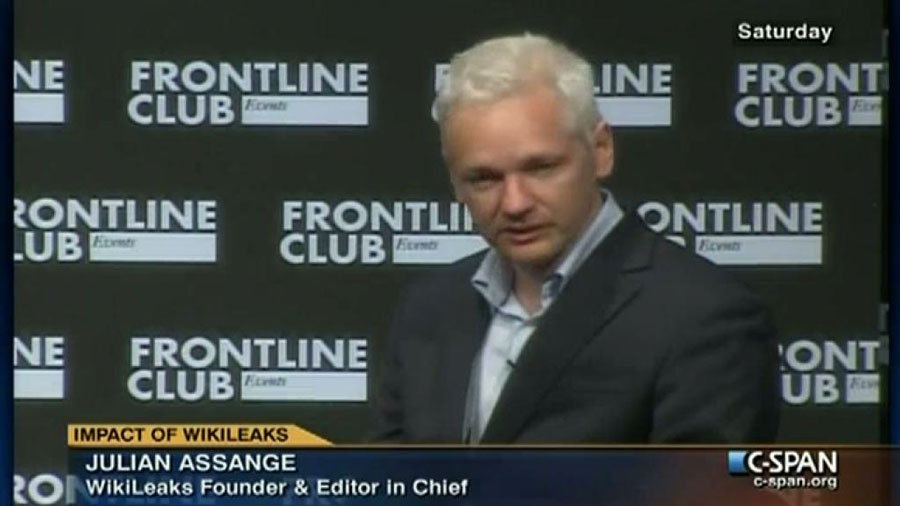
LONDON – WikiLeaks founder Julian Assange, after having his asylum at the Ecuadorian embassy in London rescinded this week, was arrested by British authorities “on behalf of the United States” to answer for a charge of conspiracy to hack a classified Defense Department computer.
Assange, 47, who originally holed up in the embassy seven years ago after having been accused of sexual assault in Sweden – a charge that has since been dropped – was also wanted by British police for jumping bail after Swedish authorities asked for his extradition.
No sooner than did U.S. lawmakers hear of Assange’s change in legal status did they unseal an indictment against him, alleging that the Wikileaks founder had conspired in 2010 with Chelsea Manning – a former U.S. Army intelligence analyst, formally known as Bradley Manning before transitioning from male to female – to illegally steal top-secret U.S. military and diplomatic documents by assisting with the cracking of the password protecting the information. From there, it is alleged, the information was to be made public in an attempt to “injure” the United States government.
Assange came to international attention when WikiLeaks – an international non-profit organization that publishes secret information, news leaks, and classified media provided by anonymous sources – published material obtained by Manning, including the Collateral Murder video, the Afghanistan war logs, the Iraq war logs, and CableGate. Following the 2010 leaks, the federal government of the United States launched a criminal investigation into WikiLeaks and asked allied nations for assistance.
Manning was sentenced to 35 years in prison in 2013, but his/her sentence was commuted by President Barack Obama to nearly seven years of confinement dating from his/her 2010. However, Manning was jailed once again in March 2019 after he/she was held in contempt of court for refusing to testify to a grand jury investigating WikiLeaks; he/she currently still remains incarcerated.
President Donald Trump had previously Tweeted in regards to his displeasure with Manning in 2017 – and his disagreement with his/her release – after he/she was publicly critical of Obama despite the fact that he had commuted his/her sentence:
In November 2010, Sweden issued an international arrest warrant for Assange in connection with allegations of sexual assault and rape, charges that he denied while maintaining that if arrested, he would be extradited from Sweden to the United States due to his role in publishing secret American documents. While Assange turned himself in to British authorities in December 2010, he later jumped bail after unsuccessfully fighting Swedish extradition and requested asylum at the Ecuadorian embassy in London in 2012; he remained there, living outside of the grip of justice for seven years, with media and various demonstrators – both for and against him – camped outside the embassy walls the entire time.
Swedish prosecutors later dropped their investigation into the rape accusation, but Assange still found himself having to answer for jumping bail, as well as fears of extradition to the United States. However, he was arrested on April 11 after Ecuador rescinded Assange’s asylum, noting that he consistently violated international conventions regarding domestic interference by continuing to publish allegedly stolen documents and information from numerous countries; in an attempt to curb this activity, the embassy had previously revoked Assange’s internet access, although it was returned a short time later.
Ecuadorian representatives also noted that Assange had worn out his welcome after engaging in activities such as blocking security cameras, installing electronic interference equipment, and attacking security guards.
Ecuadorian officials actually invited Assange the London Metropolitan Police into the embassy this week to take Assange – who reportedly resisted and had to be dragged into a waiting vehicle – into custody on his original bail jumping change, which carries a sentence of up to 12 months if he is convicted; Assange pleaded not guilty at his arraignment.
That same day of his arrest in London, U.S. lawmakers unsealed an indictment for conspiracy to commit computer intrusion against Assange, and extradition proceedings were begun, which British officials are wholly expected to honor without question.
Previously in 2017, U.S. Secretary of State Mike Pompeo – at the time CIA Director – had said that WikiLeaks was a “nonstate hostile intelligence service” and “a threat to U.S. national security” that was “often abetted by state actors like Russia.” President Trump, who had previously been supportive of Wikileaks in the past, stated this week after being asked about Assange’s arrest that “I know nothing about Wikileaks. It’s not my thing. It’s not my deal in life”
Assange is due to appear in British court again on May 2 – via video link – regarding his extradition to the United States.



Comments are closed.